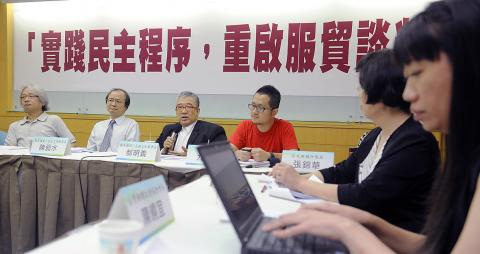Taiwanese artists, academics and representatives from the publishing and media sectors issued a joint statement yesterday calling on the government to reopen negotiations on the service trade pact that Taiwan and China signed last month.
The statement demanded that the Legislative Yuan hold individual public hearings on every industry affected by the pact and postpone a review of, or voting on, the pact until the government has released reports evaluating the impact of the agreement on Taiwan’s industries, society and national security.
The government should also recommence negotiations with China on the basis of the results of the legislature’s item-by-item review of the pact, according to the statement, which was issued by 18 academics, artists and representatives of the publishing and media industries.

Photo: George Tsorng, Taipei Times
Rex How (郝明義), a presidential adviser and chairman of Locus Publishing Co (大塊文化), questioned the negotiation process and criticized the government for not fully communicating with local businesses before signing the agreement.
Jang Show-ling (鄭秀玲), professor and chair of National Taiwan University’s Department of Economics, said the service pact would affect more than 1,000 industries and millions of workers in Taiwan, but the government has not been honest with the public about the impact of the agreement.
China has not committed in many areas to allowing Taiwanese companies to provide cross-border services, Jang said, adding that this could trigger an exodus of many Taiwanese professionals as well as small and medium-sized enterprises to China.
Under the agreement, China will open 80 service categories to Taiwanese investors, while Taiwan will open 64 categories to Chinese investment, including e-commerce, transportation, finance and medical care.
Although the sensitive publishing sector was not included in the pact, Jang questioned whether the opening of wholesale and retail services would allow Chinese publishers to sell their books in Taiwan.
“The doors are wide open,” she said.
Popular novelist and filmmaker Giddens Ko (柯景騰) called for a serious public debate on the issue, saying that the signing of the agreement should have followed a more democratic process.
“I hoped that the negotiation process could be more transparent, so that we could have a basic trust in the government,” Ko said.
Ruling and opposition legislators have reached a consensus that the agreement should be reviewed by all legislative committees during a Legislative Yuan extraordinary session, scheduled to be held from yesterday through Friday next week.

Intelligence agents have recorded 510,000 instances of “controversial information” being spread online by the Chinese Communist Party (CCP) so far this year, the National Security Bureau (NSB) said in a report yesterday, as it warned of artificial intelligence (AI) being employed to generate destabilizing misinformation. The bureau submitted a written report to the Legislative Yuan in preparation for National Security Bureau Director-General Tsai Ming-yen’s (蔡明彥) appearance before the Foreign Affairs and National Defense Committee today. The CCP has been using cognitive warfare to divide Taiwanese society by commenting on controversial issues such as Taiwan Semiconductor Manufacturing Co’s (TSMC, 台積電) investments in the

INVESTIGATION: The case is the latest instance of a DPP figure being implicated in an espionage network accused of allegedly leaking information to Chinese intelligence Democratic Progressive Party (DPP) member Ho Jen-chieh (何仁傑) was detained and held incommunicado yesterday on suspicion of spying for China during his tenure as assistant to then-minister of foreign affairs Joseph Wu (吳釗燮). The Taipei District Prosecutors’ Office said Ho was implicated during its investigation into alleged spying activities by former Presidential Office consultant Wu Shang-yu (吳尚雨). Prosecutors said there is reason to believe Ho breached the National Security Act (國家安全法) by leaking classified Ministry of Foreign Affairs information to Chinese intelligence. Following interrogation, prosecutors petitioned the Taipei District Court to detain Ho, citing concerns over potential collusion or tampering of evidence. The

‘COMPREHENSIVE PLAN’: Lin Chia-lung said that the government was ready to talk about a variety of issues, including investment in and purchases from the US The National Stabilization Fund (NSF) yesterday announced that it would step in to staunch stock market losses for the ninth time in the nation’s history. An NSF board meeting, originally scheduled for Monday next week, was moved to yesterday after stocks plummeted in the wake of US President Donald Trump’s announcement of 32 percent tariffs on Taiwan on Wednesday last week. Board members voted to support the stock market with the NT$500 billion (US$15.15 billion) fund, with injections of funds to begin as soon as today. The NSF in 2000 injected NT$120 billion to stabilize stocks, the most ever. The lowest amount it

NEGOTIATIONS: Taiwan has good relations with Washington and the outlook for the negotiations looks promising, Minister of Economic Affairs J.W. Kuo said Taiwan’s GDP growth this year is expected to decrease by 0.43 to 1.61 percentage points due to the effects of US tariffs, National Development Council (NDC) Minister Paul Liu (劉鏡清) said at a meeting of the legislature’s Economics Committee in Taipei yesterday, citing a preliminary estimate by a private research institution. Taiwan’s economy would be significantly affected by the 32 percent “reciprocal” tariffs slapped by the US, which took effect yesterday, Liu said, adding that GDP growth could fall below 3 percent and potentially even dip below 2 percent to 1.53 percent this year. The council has commissioned another institution